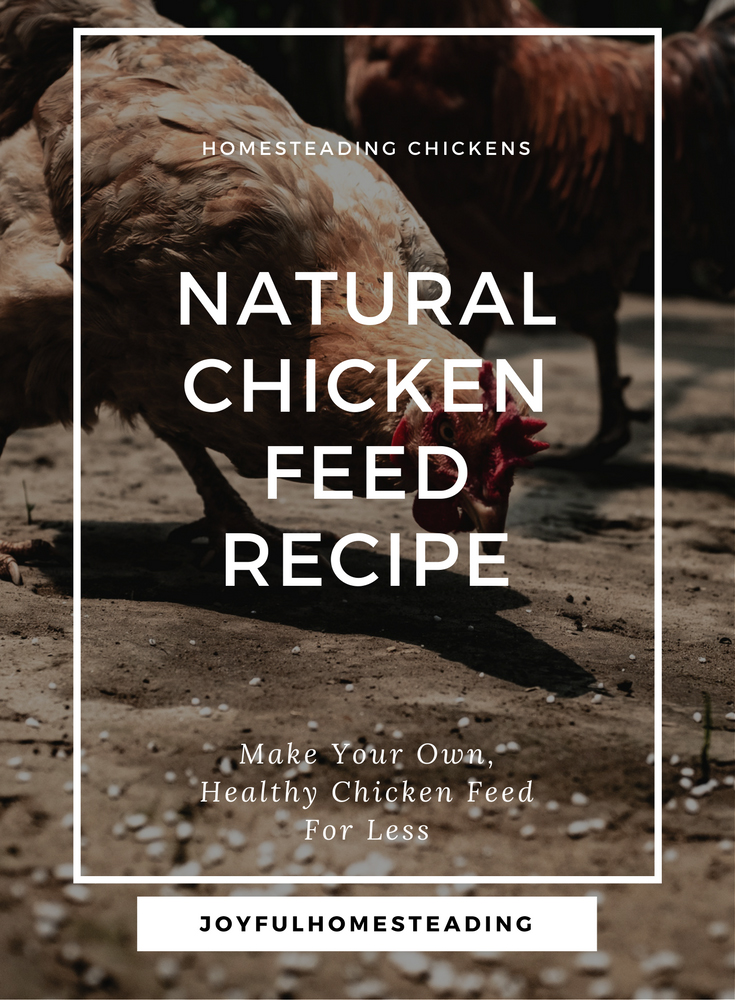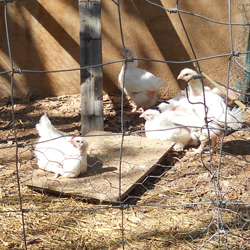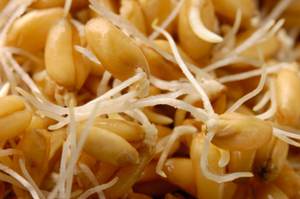Natural Chicken Feed
Natural chicken feed you make yourself by sprouting grains is the best way to have a healthy, strong flock. Grow your own chicken feed by growing, and then sprouting, wheat, and you save money. Plus, it's a lot easier than you think.

The main ingredient in this homemade chicken feed recipe is sprouted grains, such as wheat or rye.
Why Sprout Grains?
|
Vitamins and minerals that normally exist only in minute quantities in wheat seeds increase rapidly when those same grains are sprouted. That's because sprouting transforms and changes the energy of a seed. When it starts to grow, that seed creates a powerful food source designed to nourish a growing plant until it is able to spread roots and extract nutrients from the soil. |
 Sprouted wheat will make your broilers grow faster and stay healthier. |
Natural chicken feed made up of sprouted grains are loaded with vitamins C, B and E, along with vital nutrients crucial to good health, including calcium, potassium and iron. Sprouts also contain a concentrated amount of enzymes that aid in digestion.
In the same way that providing your garden with the best soil cuts down on pests and provides a more abundant harvest, feeding your flock living grains will help keep parasites down and produce more and healthier eggs and meat.
Here's the Natural Chicken Feed Recipe
I got this recipe from the Frugal Chicken. Here's what you will need to give your chickens each day, per chicken:
- 1 cup of sprouted wheat, rye or other grain
- 1/2 cup of dried peas (split peas will do just fine)
- 1/2 cup of oats
- 1 teaspoon of sesame seeds or sunflower seeds
- 1 tablespoon mealworms (find them here)
You'll probably have to get the mealworms online, such as through Amazon, but you can get grains from your local feed store. Just ask for feed wheat.
Good Source of Protein
Natural chicken feed made up of Sprouts are a large source of amino acids, proteins that help regenerate body cells and tissues. Plant proteins are easy for the body to use and help your chickens with digestion and assimilating foods.

Amino acids also help build the immune system, heal cuts and wounds faster and help with proper liver function. Give your flock sprouts on a daily basis, and you'll have a flock of happier, healthier birds.
It's Economical
Natural chicken feed you make yourself is also economical. You could buy a 50 pound bag of chicken feed from your local farmer supply store, and your chickens will end up with 50 pounds of dead food with some nutrition.
But, buy a 50-pound bag of feed wheat for about the same price, sprout that wheat and you increase the amount of food they can eat by 600 percent. And opposed to chicken feeds, sprouts are fresh and loaded with nutrients. One cup of wheat sprouted yields six cups of sprouts or more.
Even if you continue to give your flock chicken feed, by supplementing that feed with sprouted wheat, you can make that bag of feed last much longer and save on feeding costs.
Grow Your Own Wheat, Save Money
Want to save even more money? Soak some of that feed wheat overnight and then sow it into tilled soil. Wheat is easy to grow, and one pound of sown wheat will produce about nine pounds of harvested wheat. If you've got a little extra space, growing wheat is a great way to have meat and eggs at a much lower price.
Feeding Tips
Introduce this homemade chicken feed to your flock gradually. A sudden change of diet can cause a digestive upset, so a good rule of thumb is to give your flock one fourth a cup of this feed per day per bird along with their regular feed, and then gradually increase that amount.
You'll soon have happier, healthier birds who will provide your with healthy eggs you could never find in your local supermarket.










New! Comments
Have your say about what you just read! Leave me a comment in the box below.